
With food waste a mainstay on the political agenda, supermarkets are increasingly getting in on the act. There’s a growing realisation that doing their bit around food waste could have commercial as well as environmental benefits. UK waste charity WRAP estimates grocery supply chains are responsible for 1.9 million tonnes of wasted food every year in the UK, with action to prevent wasted food potentially saving businesses upwards of £300 million per year.
Although some have been quicker off the mark than others, supermarkets across Europe are competing to prove their sustainable credentials. Targets, information campaigns and innovative initiatives are coming thick and fast.
An active approach
In France, strong relations between the government and grocery sector have fostered an active approach to cracking down on food waste. Although no formal targets exist, a 2016 law banned supermarkets from throwing away unsold food. Designed to increase the rate of food donations, the legislation was enthusiastically welcomed by charitable organisations, with Jacques Bailet, head of food bank network Bancques Alimentaires, saying it would increase the “quality and diversity” on offer.
UK supermarkets are making similarly bold statements of intent. Tesco has pledged to end edible surplus food from its shops by March 2018, while at the end of January Aldi UK & Ireland said it would halve food waste by 2030. Aldi, with stores across Europe, is at the forefront of the continent’s fight against food waste; its stated goals in Britain are particularly ambitious.
Campaigns big and small
Shops are trialling a number of initiatives to cut down on the amount of food they waste. The simplest solutions have focused on relaxing waste-creating internal policies. At the end of 2017, the Co-op’s stores in East Anglia promised dried food and tinned products that had surpassed their best before dates would remain on shelves at a reduced price. Tesco was slower on the uptake, but has pledged any surplus food not taken by charities would be sold as a “bargain” to staff, thereby ensuring its zero-waste objectives are met.
Active partnerships with charities are also helping supermarkets to mitigate food waste while fulfilling their social responsibilities. Asda is flying the flag for food redistribution by providing two of the UK’s leading charities in the sector, FareShare and The Trussell Trust, with £20m of funds to be spent on infrastructure (like enhanced refridgeration) and services (notably advice facilities for the indebted and unemployed). Representatives from the charities hailed the move as the biggest single act of support since the creation of the national lottery; “We simply cannot – and will not – accept food being wasted while people in our communities go hungry,” explained Asda’s chief customer officer Andy Murray.
Elsewhere in Europe, firms are throwing their weight behind innovative solutions to the conundrum of food waste. Carrefour, Waitrose, Morrisons and M&S are all utilising filters by food tech firm Fresh, designed to remove ripening hormones from fresh produce and extend the shelf life of products. Partnerships with such firms could gain traction in the coming years; Sainsbury’s is working with Entomics to convert any food left over after all charitable options have been exhausted into fertiliser.
Education, education, education
Another option being explored by supermarkets is an increased emphasis on education to make sure their own efforts are being matched by a societal shift towards sustainability. With WRAP estimates suggesting households are responsible for roughly four times as much waste as grocery supply chains, such a shift represents a crucial precursor towards meaningful change.
Aldi’s ‘Reste retten‘ (‘save the leftovers’) campaign is using the firm’s considerable online and social media presence to educate consumers about food safety, best before dates and efficient recipes for using surplus food. Carrefour has taken a similarly active approach on leftovers, running a campaign since the end of 2017 encouraging customers to use spare vegetables in pasta recipes via in-store displays and animations.
What is striking about all these initiatives is how they have proliferated over recent years. Whether through re-examining old policies, working more closely with charities, engaging with technological opportunities or education, supermarkets that haven’t taken up the fight against food waste already are increasingly in a minority. The enthusiasm with which firms are taking to this task on their own initiative is a landmark trend for the whole foodservice sector.
Thomas Lawrence
